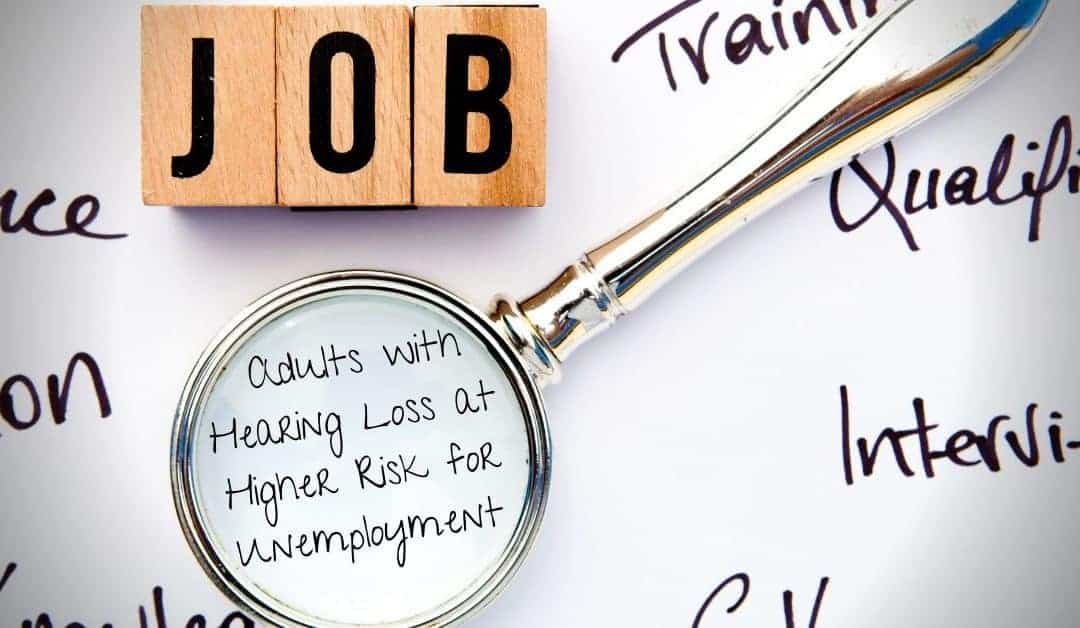In some areas of your life, hearing loss has a negative impact – it can raise the likelihood of depression and dementia, and decrease the ability to communicate with others. And now we know it could also affect your job prospects.
According to the Hearing Health Foundation, people with severe hearing loss have an unemployment rate (15.6%) twice that of the average hearing population (7.8%) and almost double that of their peers (8.3%) who use hearing aids.
It has consequences not just for job opportunities but also for your earning potential. Loss of hearing can cause those working to make less money annually. A 2012 paper published in the journal Annals of Otology, Rhinology & Laryngology, explored the link between untreated hearing loss and lower salaries. The study concluded that people with hearing loss receive much lower incomes than those with normal hearing. A similar finding showed that people who have hearing loss are often more likely to be out of work.
Why do adults suffering hearing loss face higher unemployment rates?
Following conversations: Coping with chronic hearing loss makes monitoring conversations at home and work arduous. You may struggle to follow lunch break conversations with coworkers, or keep up-to-date on everything that happens at the office. You’ll also find it difficult to follow what was said during meetings or a one-on-one conversation with your employer.
Difficulty with background noise: If you have hearing problems, you’ll be unable to hear comfortably in environments with background noise. Because of your hearing loss, your ears and brain can not distinguish between essential vocal sounds and background noise. During talks or engaged in a call with a client who is in public, you can hear all these sounds simultaneously and have a tough time.
Poor work performance: When you are unable to follow instructions or attend meetings, you may not be able to do your best job, and workers with chronic hearing loss are more likely to make mistakes. They are often ignored for promotions and more likely to be fired.
What can be done to reduce the rate of unemployment among hearing loss sufferers?
There are two ways a worker could be out of work: by getting fired, or by not getting the job in the first place. Attention must, therefore, be paid to improving the prospects of the worker in both scenarios. Let’s look at ways to help in both instances.
#1: Tips for those already in a job
The Americans with Disabilities Act (ADA) protects workers from disability-based discrimination. If you have hearing loss, you are entitled to request accommodations. Your employer will work with you to ensure that you have everything you need to do your best work.
These are some of those accommodations you can ask for:
- Ask to move to a quieter corner of the office if you work in a noisy cubicle or office, and the noise makes it difficult for you to concentrate when working or talking on the phone.
- Ask for meeting notes before a meeting so you can contribute meaningfully to the discussion.
- Ask during meetings to sit near the speaker or hear and understand what’s being said.
- Ask for any assignments and instructions in an e-mail. This will ensure you are on the same page as your employer and clearly understand your duties.
#2: Tips for those who are interviewing
If you’re a job seeker, here are some ideas for acing the interview:
Do your homework. Before the interview, ensure you have a clear understanding of the requirements and responsibilities of the job.
Consider the environment. Position yourself so that the speaker can be seen. If there are noise distractions, politely ask to move to a quieter area. If you are wearing hearing aids, double-check that they are set to the right program before the interview.
Be unapologetic and open about your hearing loss. Consider offering details of how you coped with your hearing loss effectively at work. Being open and transparent during the interview can go a long way towards improving communication and helping both you and the interviewer feel at ease.
Hearing aids are always a good idea
With speech enhancement features and reductions in background noise, hearing aids make it easier to hear, whether you are in the interview stage or already in work. Treating hearing loss with hearing aids can help those with hearing loss excel at work, communicate comfortably with coworkers, raise incomes, and reduce the likelihood of higher unemployment rates among those with hearing loss.
Enticare
If you’re looking to improve your employment prospects with hearing aids, come and talk to us! We’re sure to help you find something that suits your industry and hearing loss needs.

